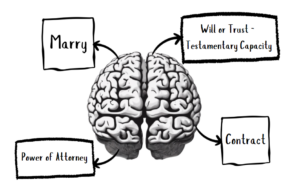Introduction
In Arizona, understanding mental capacity is crucial when engaging in any significant legal decisions, including contracts, powers of attorney, marriage, probate, estates, wills, and trusts. Mental capacity refers to the ability to comprehend the nature and consequences of one’s decisions. The legal standard varies depending on the legal action being undertaken. This guide aims to elucidate the different levels of mental capacity required for various legal transactions, helping Arizona residents navigate these complex situations with better awareness and informed consent.
The following are different types of mental capacity required for legal decisions:
Capacity to Execute a Will or Trust – “Testamentary Capacity”
This is a very often misunderstood subject. Executing a will or trust in Arizona requires testamentary capacity. In Arizona, testamentary capacity has three elements: the ability to understand (1) the extent of their assets, (2) the natural beneficiaries of their estate, and (3) the implications of their decisions on the distribution of their property upon death. For example, consider an elderly Arizona resident who wishes to leave a substantial part of their estate to a non-family member, but has dementia or Alzheimer’s disease. Even if they are confused or have some memory problems, so long as they have the ability to understand the nature and extent of their property, family and the effect of the will, they will be found to have sufficient capacity to execute a will or trust that serves as a will substitute.
Watch this video short to learn more about testamentary capacity!
Capacity to Sign a Contract
The capacity to enter into contracts, such as purchasing real estate or other property, requires a practical understanding of the contract terms and their consequences. In Arizona, this includes the ability to recognize potential financial liabilities and the benefits derived from the agreement. For instance, an individual must have the ability to understand the obligations and protections offered when entering into a lease agreement for a property. Otherwise competent individuals are bound by contracts they sign even if they do not read them. So, capacity is not determined by whether the individual actually understood the contract, unless other circumstances (such as fraud) make that issue relevant.
Capacity to Execute Power of Attorney
Granting power of attorney necessitates that the principal, the one granting the authority, at the time of executing the power of attorney, was able to reasonably comprehend the nature and effect of granting the power of attorney. A power of attorney executed by someone who lacks this capacity is considered invalid. The nature and complexity of the delegated act are factors that may effect whether the power of attorney is valid in Arizona. For instance, a straightforward sale of personal property requires less competency than giving someone authority to conduct a complex business transaction involving your entire estate. Another example, an Arizona resident might appoint an agent, also called attorney-in-fact, to manage their financial affairs if they anticipate declining health. This decision demands a clear understanding that the agent can make significant decisions about property and investments, as outlined in the power of attorney document, a critical element in Arizona estate planning.
There are many nuances involved in powers of attorney, especially if there are disputes over their validity or whether the agent exceeded their authority. Learn more in our in depth article about Arizona Powers of Attorney.
Capacity to Marry
In terms of personal relationships, the capacity to marry involves understanding the legal and personal implications of forming a matrimonial bond, similar to any other contract. This is typically a lower threshold compared to financial transactions but still requires one to understand the rights and responsibilities that marriage entails. A couple in Arizona deciding to marry must grasp the legal implications, such as property rights and spousal support obligations, under Arizona family law.
Conclusion
 Mental capacity varies significantly across different legal domains, particularly in areas concerning Arizona contracts, powers of attorney, marriage, probate, estate planning, wills, and trusts. Understanding these variations is crucial for ensuring that all legal actions are taken with full awareness and proper consent. Where applicable, Arizona residents facing complex legal decisions should consult with a qualified Arizona probate and estate attorney to navigate these issues effectively.
Mental capacity varies significantly across different legal domains, particularly in areas concerning Arizona contracts, powers of attorney, marriage, probate, estate planning, wills, and trusts. Understanding these variations is crucial for ensuring that all legal actions are taken with full awareness and proper consent. Where applicable, Arizona residents facing complex legal decisions should consult with a qualified Arizona probate and estate attorney to navigate these issues effectively.
If you have any questions about the validity of a will, trust, deed or other document in Arizona, we encourage you to contact our experienced Arizona probate and estate attorneys at Berk Law Group.

